英语虚拟语气语法归纳总结
(完整版)英语虚拟语气语法归纳总结
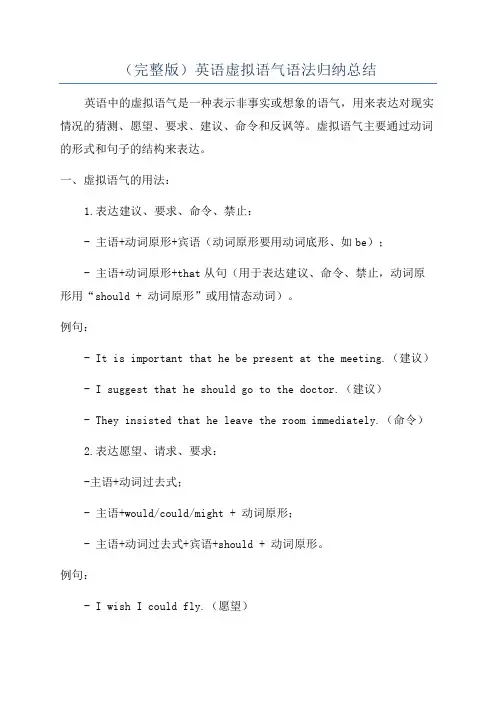
(完整版)英语虚拟语气语法归纳总结英语中的虚拟语气是一种表示非事实或想象的语气,用来表达对现实情况的猜测、愿望、要求、建议、命令和反讽等。
虚拟语气主要通过动词的形式和句子的结构来表达。
一、虚拟语气的用法:1.表达建议、要求、命令、禁止:- 主语+动词原形+宾语(动词原形要用动词底形、如be);- 主语+动词原形+that从句(用于表达建议、命令、禁止,动词原形用“should + 动词原形”或用情态动词)。
例句:- It is important that he be present at the meeting.(建议)- I suggest that he should go to the doctor.(建议)- They insisted that he leave the room immediately.(命令)2.表达愿望、请求、要求:-主语+动词过去式;- 主语+would/could/might + 动词原形;- 主语+动词过去式+宾语+should + 动词原形。
例句:- I wish I could fly.(愿望)- I would appreciate it if you could help me.(请求)3.表示虚拟条件:- If条件从句中的谓语动词用过去完成时,主句用would/should/might/could + have + 过去分词;- If条件从句中的谓语动词用过去时,主句用would/should/could + 动词原形。
例句:- If I had known his phone number, I would have called him.(虚拟条件)- If you had listened to me, we could have finished the project earlier.(虚拟条件)4.表达建议、要求、祝愿:- If only内部称述 + 主语 + 过去式。
英语语法 虚拟语气的知识点归纳
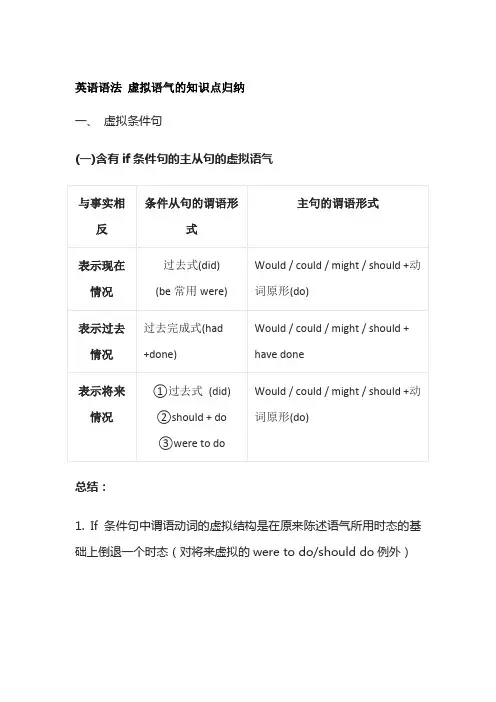
英语语法虚拟语气的知识点归纳一、虚拟条件句(一)含有if条件句的主从句的虚拟语气总结:1. If 条件句中谓语动词的虚拟结构是在原来陈述语气所用时态的基础上倒退一个时态(对将来虚拟的were to do/should do例外)2. 主句要借助于情态动词的过去式,后跟动词原形(现在或将来)或have done(过去);if条件句中只出现一个情态动词,即对将来虚拟的should.3.做此类题目时一定要分清是从句还是主句谓语动词的虚拟,还要把握好时态。
注意:1. 在虚拟条件从句中,动词“be”的过去时态一律用”were”,不用was。
2. 在虚拟条件状语中如果有were, should, had这三个词中任何一个,可省略if,把这三个词提到主语之前, 变成:were/should/had +主语+剩余成分。
3.在虚拟条件状语从句中,省略连词的倒装形式的句首不能用动词的缩略形式。
如我们可说Were I not to do., 而不能说Weren‘t I to do。
4.在表示与将来事实相反的条件句中,只能用should,而不能用would,could和might 等。
5.主句中的should通常用于第一人称,would,could以及might 可以用于各种人称eg :①If I were a bird, I could fly in the air.如果我是一只小鸟,我就能在空中飞行。
②I wish I could pass the examination.我希望我能通过考试。
在虚拟条件句中,对于与将来事实相反的情形,请注意以下几点:(1)条件从句表示的内容与将来事实相反,实为对将来情况的推测,用过去时表示虚拟;(2)条件从句谓语除用过去式外,有时也用“should+动词原形(表示可能性极小,常译为“万一”)”或“were to+动词原形(表示与将来事实相反的假设)”;(3)条件从句使用“should+动词原形”这样的谓语形式时,主句谓语除可用“should (would, could, might)+动词原形”这样的虚拟语气形式外,也可用直陈语气或祈使语气。
虚拟语气的用法总结
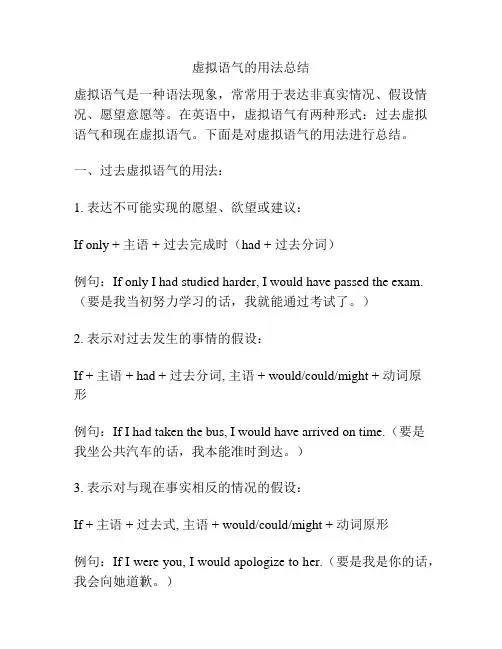
虚拟语气的用法总结虚拟语气是一种语法现象,常常用于表达非真实情况、假设情况、愿望意愿等。
在英语中,虚拟语气有两种形式:过去虚拟语气和现在虚拟语气。
下面是对虚拟语气的用法进行总结。
一、过去虚拟语气的用法:1. 表达不可能实现的愿望、欲望或建议:If only + 主语 + 过去完成时(had + 过去分词)例句:If only I had studied harder, I would have passed the exam.(要是我当初努力学习的话,我就能通过考试了。
)2. 表示对过去发生的事情的假设:If + 主语 + had + 过去分词, 主语 + would/could/might + 动词原形例句:If I had taken the bus, I would have arrived on time.(要是我坐公共汽车的话,我本能准时到达。
)3. 表示对与现在事实相反的情况的假设:If + 主语 + 过去式, 主语 + would/could/might + 动词原形例句:If I were you, I would apologize to her.(要是我是你的话,我会向她道歉。
)4. 表达对不可能实现的条件:If only + 过去式例句:If only I had a million dollars.(要是我有一百万美元该多好。
)二、现在虚拟语气的用法:1. 表达建议、命令等正式用法:表达建议:(should +动词原形/动词原形)例句:It's important (that) you should take some rest.(你应该休息一下,这很重要。
)表达命令:(应用“命令式”的虚拟形式)例句:It's vital (that) he be here on time.(他必须准时到达,这很重要。
)2. 表达愿望、要求、建议等陈述式的用法:It's time/It's high time + 过去式例句:It's time you went to bed.(你该去睡觉了,时间到了。
虚拟语气英语知识点总结
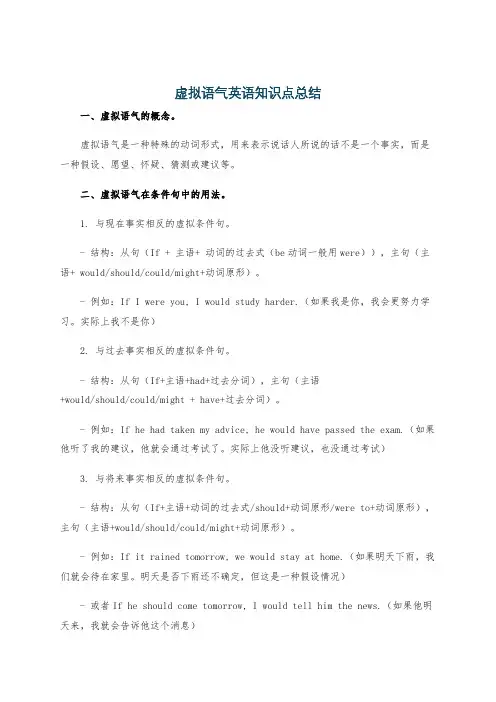
虚拟语气英语知识点总结一、虚拟语气的概念。
虚拟语气是一种特殊的动词形式,用来表示说话人所说的话不是一个事实,而是一种假设、愿望、怀疑、猜测或建议等。
二、虚拟语气在条件句中的用法。
1. 与现在事实相反的虚拟条件句。
- 结构:从句(If + 主语+ 动词的过去式(be动词一般用were)),主句(主语+ would/should/could/might+动词原形)。
- 例如:If I were you, I would study harder.(如果我是你,我会更努力学习。
实际上我不是你)2. 与过去事实相反的虚拟条件句。
- 结构:从句(If+主语+had+过去分词),主句(主语+would/should/could/might + have+过去分词)。
- 例如:If he had taken my advice, he would have passed the exam.(如果他听了我的建议,他就会通过考试了。
实际上他没听建议,也没通过考试)3. 与将来事实相反的虚拟条件句。
- 结构:从句(If+主语+动词的过去式/should+动词原形/were to+动词原形),主句(主语+would/should/could/might+动词原形)。
- 例如:If it rained tomorrow, we would stay at home.(如果明天下雨,我们就会待在家里。
明天是否下雨还不确定,但这是一种假设情况)- 或者If he should come tomorrow, I would tell him the news.(如果他明天来,我就会告诉他这个消息)- 以及If I were to see her tomorrow, I would give her the book.(如果我明天见到她,我就会把书给她)三、虚拟语气在宾语从句中的用法。
1. wish后的宾语从句。
- 表示与现在事实相反的愿望,从句谓语动词用过去式(be动词用were)。
虚拟语气的用法归纳
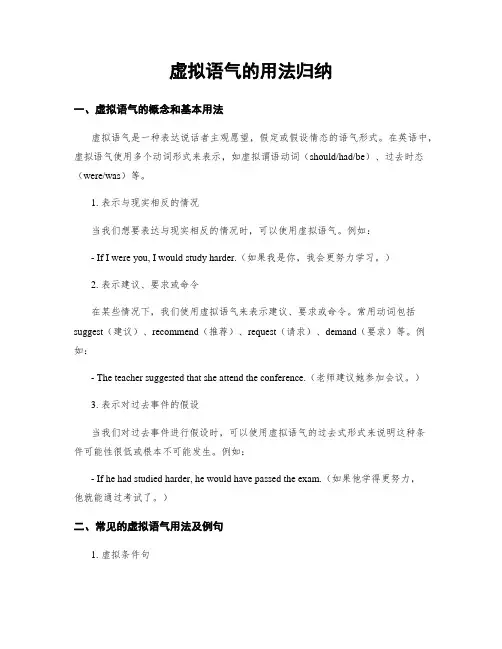
虚拟语气的用法归纳一、虚拟语气的概念和基本用法虚拟语气是一种表达说话者主观愿望,假定或假设情态的语气形式。
在英语中,虚拟语气使用多个动词形式来表示,如虚拟谓语动词(should/had/be)、过去时态(were/was)等。
1. 表示与现实相反的情况当我们想要表达与现实相反的情况时,可以使用虚拟语气。
例如:- If I were you, I would study harder.(如果我是你,我会更努力学习。
)2. 表示建议、要求或命令在某些情况下,我们使用虚拟语气来表示建议、要求或命令。
常用动词包括suggest(建议)、recommend(推荐)、request(请求)、demand(要求)等。
例如:- The teacher suggested that she attend the conference.(老师建议她参加会议。
)3. 表示对过去事件的假设当我们对过去事件进行假设时,可以使用虚拟语气的过去式形式来说明这种条件可能性很低或根本不可能发生。
例如:- If he had studied harder, he would have passed the exam.(如果他学得更努力,他就能通过考试了。
)二、常见的虚拟语气用法及例句1. 虚拟条件句虚拟条件句表示与现实相反的条件和可能性。
根据真实性、虚假性和时间性的不同,分为三种类型:- Type 1:表示可能发生的情况。
If + 主语 + 动词过去式,主语 + would/could/might + 动词原形。
例如:If it rains tomorrow, we will stay at home.(如果明天下雨,我们会待在家里。
)- Type 2:表示现在或将来不太可能发生的情况。
If + 主语 + 动词过去式,主语 + would/could/might + 动词原形。
例如:If I were rich, I would travel around the world.(如果我有钱,我会周游世界。
英语《虚拟语气》语法知识总结归纳
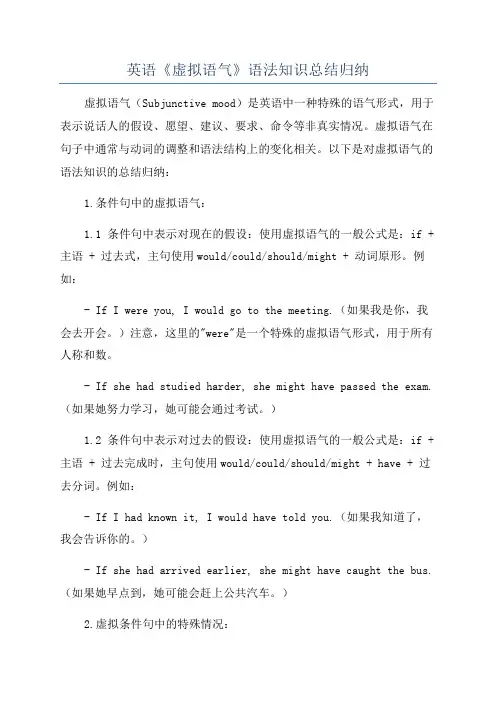
英语《虚拟语气》语法知识总结归纳虚拟语气(Subjunctive mood)是英语中一种特殊的语气形式,用于表示说话人的假设、愿望、建议、要求、命令等非真实情况。
虚拟语气在句子中通常与动词的调整和语法结构上的变化相关。
以下是对虚拟语气的语法知识的总结归纳:1.条件句中的虚拟语气:1.1 条件句中表示对现在的假设:使用虚拟语气的一般公式是:if + 主语 + 过去式,主句使用would/could/should/might + 动词原形。
例如:- If I were you, I would go to the meeting.(如果我是你,我会去开会。
)注意,这里的"were"是一个特殊的虚拟语气形式,用于所有人称和数。
- If she had studied harder, she might have passed the exam.(如果她努力学习,她可能会通过考试。
)1.2 条件句中表示对过去的假设:使用虚拟语气的一般公式是:if + 主语 + 过去完成时,主句使用would/could/should/might + have + 过去分词。
例如:- If I had known it, I would have told you.(如果我知道了,我会告诉你的。
)- If she had arrived earlier, she might have caught the bus.(如果她早点到,她可能会赶上公共汽车。
)2.虚拟条件句中的特殊情况:2.1 在虚拟条件句中表示命令、建议时,主句中的动词可以使用动词原形(而不是would/could/should/might + 动词原形)。
例如:- If you have any questions, please let me know.(如果你有任何问题,请告诉我。
)- If I were you, I would take a break.(如果我是你,我会休息一下。
英语虚拟语气语法总结
虚拟语气语法总结1.虚拟条件句谓语动词的构成形式条件从句的谓语动词主句的谓语动词与现在事实相反动词过去式(be 一般用were )与过去事实相反had +过去分词与将来事实可能相反1.动词过去式2.should+动词原形3.were to+动词原形倒装结构1)Had you (=If you had) invited us, we would have come to your party. 2)Were I (=If I were) you, I would do more practice after class. 3)Should it rain tomorrow, I wouldn ’t go.2.虚拟条件句的特殊用法A.混合虚拟条件句条件从句的动作和主句的动作不是同时发生.If he had followed the doctor ’s advice, he would be quite all right now. (从句述说过去,主句述说现在。
)If I were you, I wouldn ’thavemissed the film last night. (从句述说现在,主句述说过去。
)If I had had more self-confidence, I would become a teacher. (从句述说过去,主句述说现在。
)If the rescue team hadn ’t found him, he would be dead. (从句述说过去,主句述说现在。
)If she didn ’t love driving, she wouldn ’t have become a driver.would+动词原形would have+过去分词++would+动词原形(从句述说现在,主句述说已发生。
)B.含蓄虚拟条件句虚拟条件通过下述词语引出的短语:介词with, without, but for, if it had not been / if it were not for…etc分词supposing动词suppose并列连词or, otherwise, but, though, etc例如:1)Icouldn’t have won the competition without your encouragement.2)With your assistance (=If we had your assistance), we might finish the plan earlier3)Butfor you advice, I wouldnotbe able to do this work.4)Victor obviously doesn’t know what’s happened,otherwise he wouldn’thavemade such a stupidremark.C.虚拟条件句中的表示结果的主句有时形式上可以省略,但意义上仍然存在。
英语中虚拟语气用法总结
英语中虚拟语气用法总结1. 与现在事实相反的虚拟语气用于表达与现在相反的情况,即事情并不是现在所描述的那样。
通常用“were”引导虚拟语气。
例如:If I were you, I would quit this job.(如果我是你,我会辞职。
)2. 与过去事实相反的虚拟语气用于表达与过去相反的情况,即过去并不是现在所描述的那样。
通常用“had”引导虚拟语气。
例如:If I had known earlier, I would have attended the meeting.(如果我早知道,我会参加会议的。
)3. 与过去将来事实相反的虚拟语气用于表达过去将来时,即过去某个时间点以前就应该发生的事情并没有发生的情况。
通常用“had”引导虚拟语气。
例如:If I had finished my work earlier, I would have gone to the movieswith my friends.(如果我早点完成工作,我会和朋友去看电影的。
)4. 与现在将来可能性相反的虚拟语气用于表达现在将来的可能性,即可能会发生但不太可能的情况。
通常用“should”或“were to”引导虚拟语气。
例如:If I were to win the lottery, I would travel around the world.(如果我中了彩票,我会周游世界的。
)5. 与过去将来可能性相反的虚拟语气用于表达过去将来的可能性,即曾经可能会发生但最终却没发生的情况。
通常用“should”或“were to”引导虚拟语气。
例如:If I should fail the exam, I would have to retake it in three months.(如果我考试不及格,我就得三个月后再次参加考试。
)。
关于英语虚拟语气的用法总结
关于英语虚拟语气的用法总结英语虚拟语气的用法总结11、表示与现在事实相反的情况:从句:主语+过去时主句:主语+should/would/could/might+doeg:1.If I were you,I would take an umbrella.如果我是你,我会带把伞.(事实:我不可能是你)2.If I knew his telephone number,I would tell you.2、表示与过去事实相反的情况从句:主语+had+done主句:主语+should/would/could/might+have doneeg:1. If I had got there earlier,I should/could have met her.如果我早到那儿,我就会见到她. (事实:去晚了)2.If he had taken my advice,he would not have made such a mistake.如果他听我的劝告的话,就不会犯这样的错误了. (事实:没有听我的话)3、表示对将来情况的主观推测从句:主句①if+主语+were to do :①主语+should/would/could/might+do②if+主语+did/were ②主语+should/would/could/might+do③if+主语+should+do ③主语+should/would/could/might+doeg:如果他明天来这儿的话,我就跟他谈谈.(事实:来的可能性很小)2.If there were a heavy snow next Sunday,we would not go skating.如果下周日下大雪,我们就不能去滑冰了.(事实:不知能否下雪)3.If she were to be here next Monday,I would tell her about the matter.如果她下周一来这儿的话,我就会告诉她这件事的始末.英语虚拟语气的用法总结2第一部分:语气的定义和种类1 语气(mood)语气是动词的一种形式,表示说话人对其中一行为或事情的看法和态度。
高中英语虚拟语气语法知识总结
高中英语虚拟语气语法知识总结一、虚拟语气的定义虚拟语气是指用来表达非真实情况、建议、建议、命令等含义的一种语气。
虚拟语气有三种情况:虚拟条件句、虚拟语气与情态动词。
二、虚拟条件句1. 条件句的形式a. 如果条件从句是对现在事实的虚拟,主句使用过去式。
b. 如果条件从句是对过去事实的虚拟,主句使用过去完成时。
c. 如果条件从句是对将来可能发生的情况的虚拟,主句使用情态动词would或should。
d. 如果条件从句是对永远不可能实现的情况的虚拟,主句使用过去完成时。
2. 虚拟条件句的用法a. 与现在事实相反:If I were you, I would study harder.(如果我是你,我会更加努力研究。
)b. 与过去事实相反:If I had known, I would have helped.(如果我当时知道,我会帮忙的。
)c. 对将来可能发生的情况表示不确定性:If it rains tomorrow, I will stay at home.(如果明天下雨,我会待在家里。
)d. 对永远不可能实现的情况表示遗憾:If only I had studied harder, I would have passed the exam.(要是我努力研究了,就能通过考试了。
)三、虚拟语气与情态动词1. 情态动词can/coulda. 能够做某事:He can play the piano.(他会弹钢琴。
)2. 情态动词may/mighta. 可能:They may be at home.(他们可能在家。
)b. 建议:He may try harder.(建议他努力。
)3. 情态动词shoulda. 应该:You should take a break.(你应该休息一下。
)b. 表示可能:They should be finished by now.(他们现在可能已经完成了。
)四、总结在高中英语中,虚拟语气是一种常见的语法现象,用来表示非真实情况、建议、命令等含义。
- 1、下载文档前请自行甄别文档内容的完整性,平台不提供额外的编辑、内容补充、找答案等附加服务。
- 2、"仅部分预览"的文档,不可在线预览部分如存在完整性等问题,可反馈申请退款(可完整预览的文档不适用该条件!)。
- 3、如文档侵犯您的权益,请联系客服反馈,我们会尽快为您处理(人工客服工作时间:9:00-18:30)。
虚拟语气:表示说的话不是事实,不可能发生或者说可能性很小的情况,表达一种愿望、建议、假设。
if were/did, would doif had done, would have doneif were to do/should do, would do举例:If I were you, I would do nothing about it.If you had taken your teacher’s advice, you wouldn’t have made such a mistake.If it were to/ should rain tomorrow(表示降水率很低),they wouldn’t go shopping.附注:虚拟语气,条件状从倒装状语从句中,去掉if,提前were/ had/ should如:If I were you, I would give up.→Were I you, I would give upIf you had taken the advice, you would have….→Had you taken the advice, you would have…If the world should come to an end,……→Should the world come to an end……另外,without, but for, otherwise构成的条件状语从句中,也有含蓄的虚拟语气But for the popularization of electricity, we would lead a whole different life today. (popularization 普及,publicity 宣传)Without your help, I would have failed.We’ll go earlier, otherwise we wouldn’t get a seat. (表示可能性小)但其实,高中英语考试也常考:错综虚拟语气条件句即:假设条件状从发生的时间与所假设的谓语动词不一致,此时,主句和从句要根据各自的时间而定。
举例:If our government had known better how to lay out the road construction, the traffic jam problem would not be so serious today.(lay out 规划、设计、安排、陈设、摆放… layout n.布局、规划)二、特殊句式:I wish I hadn’t made such an irrevocable mistake. (irrevocable不可撤销、不可以挽回的)2.「十个词」一坚持:insist (表示坚持主张、认为,不表示坚持说)二命令:order, command三建议:advise, propose, suggest (表示建议,不表示表明、显示、暗示)四要求:desire, demand, require, request (两R两D)这些动词后面的宾语从句要使用(should +) do的形式should可省略例:We suggested that Tom (should)have a rest.It’s suggested that the plan be carried out before long.(before long, 不久之后, long before很久以前)尝试翻译:他坚决要求我到场同时,这些动词的名词形式构成的名词性从句(主语从句、表语从句、同位语)也要用虚拟语气order, advice, suggestion, proposal, demand, request, desire.例It’s an order that the soldiers obey the rules in the army.My suggestion is that everyone of us three finish one part of this project and then we integrate them together. (integrate整合)3.would rather 宁愿I would rather you had been to the movie instead of me.Don’t come today, I would rather you came tomorrow.4.部分As if/though 句子好像、似乎Tom told me this fairy tale in a manner as if it had happened for real yesterday. 5.If only……. 要是…就好了If only she knew that it's I who sent the gift to her.6.It’s ( about/ high) time that 是时候做……+ 1、过去式2、should doIt's time that you went to bed.说到这里,补充两个句式:It is the 1st (2nd /3rd ) time that … have/ has done….It was the 1st time that … had done….7.It’s necessary/ strange/ natural/ important/essential that…….从句动词用(should) doIt’s essential that we master a foreign language when doing international trade and business. (essential 必要的、本质的、基本的…..)8.情态动词+have donewould have done 本来要做could have done 本能够做(却没做)might have done 本来可能should/ought to have done 本来应该做shouldn’t/ oughtn’t to have done 本来不应该做needn’t have done 本来不必要做你本来不应该告诉她真相。
当时我没有足够的钱,否则我会买那本书的。
练习:1.When a pencil is partly in a glass of water, it looks as if it_______.A. breaksB. has brokenC. were brokenD. had been broken2. He talked as if he ______ for years.A. is living thereB. was living thereC. has lived thereD. had lived there.3. ______ you listened to the doctor, you ______all right now.A. Had, would beB. Had, would have beenC. If, would beD. If, would have been4. If there were no subjunctive mood, English _______ much easier.A. will beB. would beC. could have beenD. would have been5.______ today, he would get there by Friday. (双选)A. Had he leftB. Was he leavingC. Were he to leaveD. If he leaveE. Would he leave6. He treated me as though ____ his own son.A. I amB. I would beC. I wasD. I were7. _________I be free tomorrow, I could go with youA. CouldB. ShouldC. MightD. Must8. Should it rain, the crops__________A. would be savedB. would have been savedC. will be savedD. had been saved9. Have you ever been to Tokyo?----No. but I wish I ______.A.haveB. willC. doD. had10 .I wish I _______ there then.A.wasB. wereC. had beenD. would be11. She was so upset that she burst into tears.I would rather you _______her all about it,A didn’t tell B. hadn’t toldB.don’t tell D. won’t tell12. The young man insisted that he __________ nothing wrong and ______freeA. did; setB. had done; should be setC. should do; be setD. had done; must be set13. He made the demand that the journalists _____ at once ______IraqA. leave; forB. leave; toC. left; toD. to be left; for14. The guard at the gate insisted that everybody _____ the rules.A. obeysB. obey15. It’s time that we _____ to bed.A. must goB. will goC. wentD. have gone16. If only I _________ my watch.A. hadn’t lostB. haven’t lostC. didn’tD. don’t17. If only I _______ as young as you are.A. beingB. amC. beD. wereE. was18. A few minutes earlier and we ______ the train. (双选)A. have caughtB. had caughtC. were to catchD. could have caughtE. would have caught19.Do you know where he comes from?No, but his accent suggests that he _____from the south.A.wasB. beC. isD. were20. I was quite busy yesterday, otherwise I _______ to the meeting.A. cameB. would comeC. had comeD. would have come。
